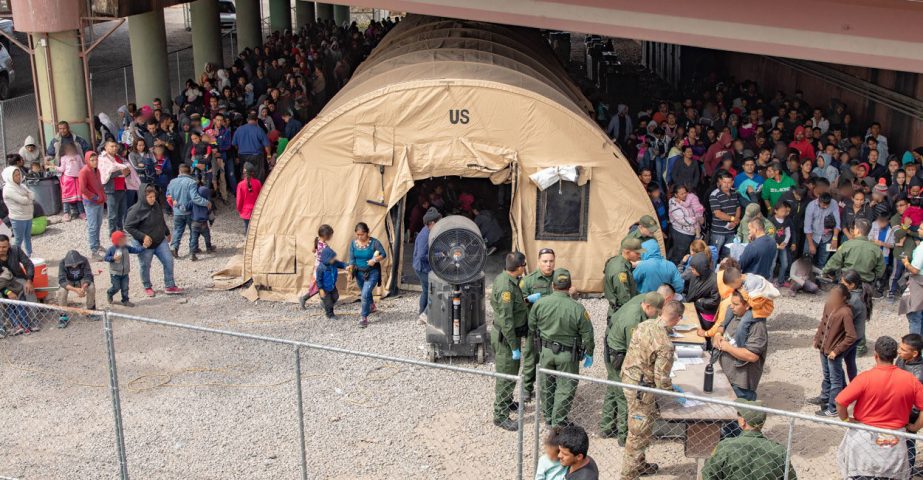NJ Governor: ‘I Look Forward to Signing’ Bill Legalizing Assisted Suicide, by Alex Madajian
April 2, 2019President Trump Will Nominate Amy Barrett When Ruth Bader Ginsburg’s Seat Opens Up, by Micaiah Bilger
April 2, 2019
By Patrick Goodenough, CNSNews, April 2, 2019
(CNSNews.com) – The Trump administration is speeding up the temporary deployment of another 750 Customs and Border Protection (CBP) personnel – and possibly more – to parts of the Southwest border most affected by the influx of migrants.
The administration also has directed CBP to return to Mexico hundreds of migrants more each day than are currently being sent back.
Homeland Security Secretary Kirstjen Nielsen issued the directives in a memorandum to CBP Commissioner Kevin McAleenan on Monday, telling him to initiate “emergency surge operations.”
She instructed CBP to speed up the planned reallocation of up to 750 officers to sectors “affected by the emergency,” and authorized it to exceed that target, reporting back to her if there were plans to reassign more than 2,000 personnel for the task.
Nielsen also directed CBP immediately to expand a policy put in place earlier this year – the so-called Migrant Protection Protocols (MPP), under which certain unauthorized migrants are returned to Mexico to await the outcome of their immigration proceedings.
She said the agency should plan to extend the MPP beyond its current areas of operation in California and Texas, and that it must “return hundreds of additional migrants per day above current rates to Mexico, consistent with U.S. law and humanitarian obligations.”
“The crisis at our border is worsening, and DHS will do everything in its power to end it,” Nielsen said. “We will not stand idly by while Congress fails to act yet again, so all options are on the table.”
Nielsen has argued that the MPP policy will help to cut down false asylum claims, reduce illegal migration, free up resources and allow for greater attention to be paid to genuine cases, while ensuring vulnerable applicants are protected while waiting in Mexico for an immigration court reviews their claims.
Last week McAleenan reported that March was on track to see 100,000 migrant apprehensions and encounters at the border, the highest number in more than a decade, with 90 percent of those being apprehended crossing illegally between points of entry.
The projected number for March, 90,525 apprehensions, was up from 37,390 the previous March and from 12,195 in March 2017.
President Trump has warned he could close the border if Mexico does not stop northbound “caravans” of migrants, many from the northern triangle countries – Guatemala, El Salvador and Honduras.
“We were not lying to people when we said that this was an emergency,” acting White House chief of staff Mick Mulvaney said on Sunday. “Very few people believed us, especially folks in the media and the Democrat Party. It is an emergency.”
Secretary of State Mike Pompeo was asked Monday what had changed since he praised Mexico’s efforts in securing the border last December.
“What happened in these past few months that the president is now threatening to shut down the border?” a reporter asked him during a visit to the U.S. Army War College.
“Just look at the math,” Pompeo replied. “Just look at the math. How many folks are coming across? This is a crisis. We need to fix it.”
Trump late last week directed the State Department to cut foreign assistance to the three northern triangle countries, after accusing them not just of not doing anything to stop migrant caravans, but of putting “their worst people” into the caravans headed for the U.S.
The move drew strong criticism from Democrats, with Sen. Robert Menendez (D-N.J.), ranking member on the Senate Foreign Relations Committee, asserting that it “would undermine American interests and put our national security at risk.”
A group of House Democrats including House Foreign Affairs Committee chairman Eliot Engel (D-N.Y.), who were visiting El Salvador at the time, saidthe decision “will only result in more children and families being forced to make the dangerous journey north to the U.S.-Mexico border.”
Just a day before Trump announced the planned aid cut, Nielsen met in Honduras with security officials from Honduras, El Salvador and Guatemala to discuss border security.
They signed a regional compact designed to improve cooperation, prevent the formation of new migrant caravans, and address “root causes of the migration crisis,” with a focus on combating human trafficking, smuggling and transnational crime, intelligence sharing, and strengthening air, land, and maritime border security.
https://www.cnsnews.com/news/article/patrick-goodenough/nielsen-orders-emergency-surge-operations-southwest-border







